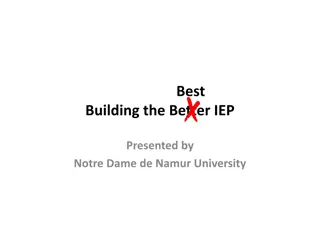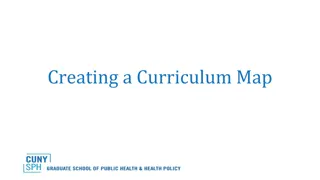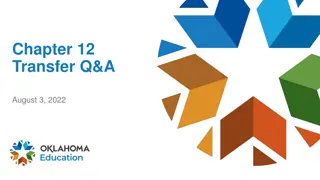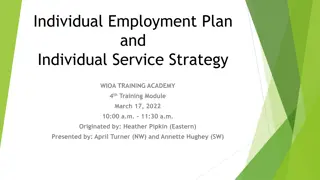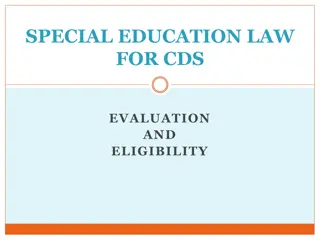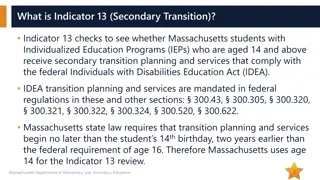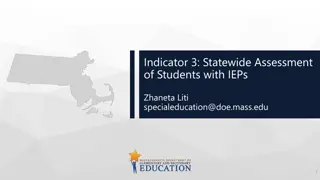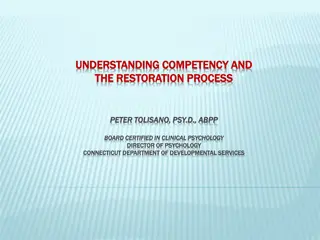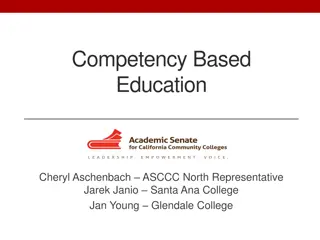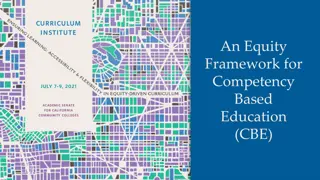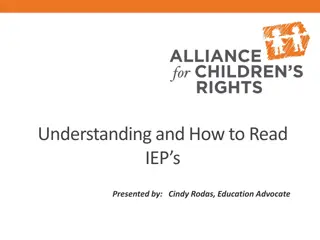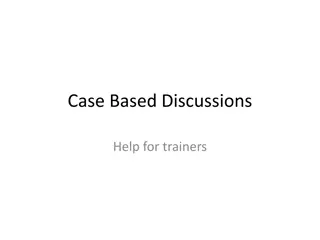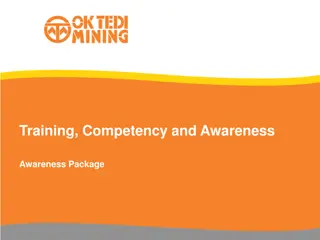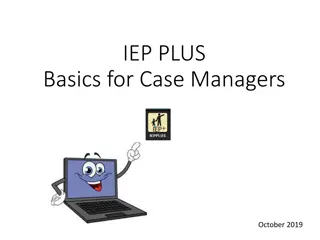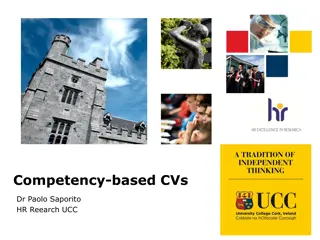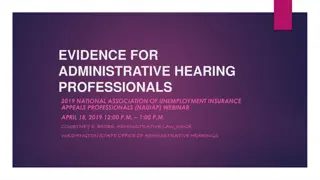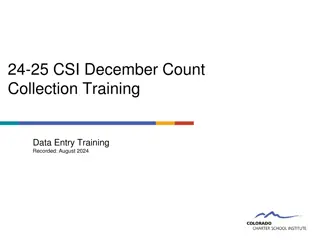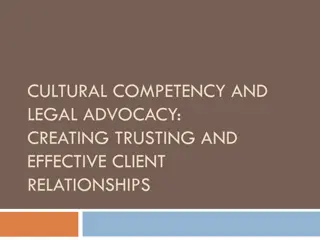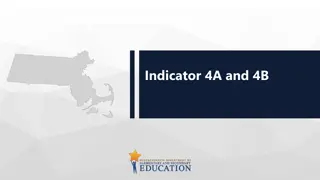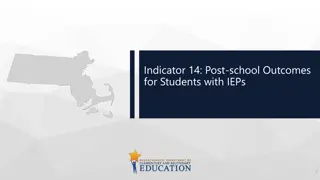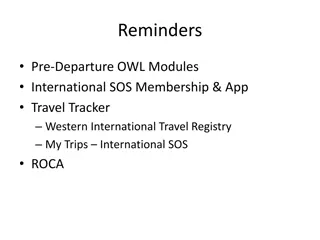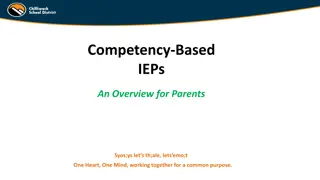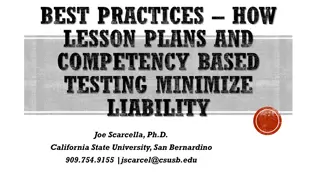Best Practices for Special Education Case Management Workshop
This workshop presented by Notre Dame de Namur University focuses on equipping learners with the best practices in special education case management. Participants will gain knowledge on SpEd case management, collaboration strategies, and creating legally defensible IEPs. The workshop covers topics s
7 views • 214 slides
Digital Competency Maturity Model 2.0 for Accounting Firms - Overview and Implementation
The Digital Competency Maturity Model 2.0 (DCMM 2.0) is a framework designed to help professional accounting firms evaluate and enhance their digital competencies. Released as an upgrade to the previous version in 2017, DCMM 2.0 offers a structured approach for firms to assess their current level of
4 views • 19 slides
Approaches to Competency-Based Approaches: Support Devices at the UHA Scale
Deployment of Competency-Based Approaches at UHA entails personalized support mechanisms for undergraduate, professional, and master's students. The process involves multiple levels of actors, structured timelines, and a framework for initiating and implementing the approach. Various strategies are
1 views • 28 slides
Understanding Competency-Based Education in Modern Curricula
Explore the differences between new and old curricula, grasp the concept of theoretical versus competency-based education, and delve into the benefits of competency-based learning. Discover how competency-based education shifts the focus from grades to students' competence in subjects.
4 views • 10 slides
Changes in ITC for 2025: Exam Structure, Competency Framework, and More
Exciting changes are coming to the Initial Test of Competence (ITC) in 2025, including adjustments to the exam structure, mark allocation, number of papers, competency framework, and more. The new competency framework emphasizes six competency areas, with a focus on an even spread over three papers.
18 views • 4 slides
Creating a Curriculum Map for Competency-Based Education
This presentation aims to guide faculty and staff in competency-based curriculum mapping at the program level. It covers the definition of curriculum mapping, a recommended framework, steps for identifying program competencies, developing a matrix, and mapping courses to competencies. Utilize this r
0 views • 11 slides
Guidelines for Student Transfers and IEPs in Oklahoma Schools
This document outlines procedures for student transfers in Oklahoma schools, specifically focusing on transfers for students with disabilities. It covers aspects such as transferring students with expired IEPs, revocation of disability recognition, and the process for move-in students within the sta
0 views • 7 slides
Understanding Individual Employment Plan (IEP) and Individual Service Strategy (ISS) in WIOA Training Academy
Individual Employment Plan (IEP) and Individual Service Strategy (ISS) are essential components of the WIOA Training Academy, tailored to meet the career needs of participants under various WIOA programs. IEPs focus on personalized career services for adults and dislocated workers, while ISSs are sp
1 views • 23 slides
Special Education Law and Evaluation Process for CDS Eligibility
Understanding special education law and the evaluation process for Children with Disabilities (CDS) is crucial for determining eligibility, developing Individualized Education Programs (IEPs), and monitoring progress. Key steps include IDEA requirements, obtaining informed consent, conducting evalua
0 views • 28 slides
Competency Evaluation Process: A Comprehensive Overview
This document delves into the process of competency evaluations, specifically focusing on competency restoration and attainment at Utah State Hospital. It covers key steps such as petition, order for evaluation, findings of incompetency, competency restoration treatment, and review. It outlines the
0 views • 41 slides
Understanding Massachusetts Indicator 13 for Secondary Transition Planning
Indicator 13 in Massachusetts assesses the compliance of secondary transition planning and services for students with IEPs aged 14 and above, ensuring adherence to federal laws. The state collects data through file reviews to calculate a statewide compliance rate aiming for 100%. Compliance is measu
0 views • 5 slides
Statewide Assessment of Students with IEPs - Overview
Indicator 3 focuses on the assessment of children with Individualized Education Programs (IEPs) in Massachusetts. It includes participation rates, proficiency rates against regular and alternate academic achievement standards, and gap analysis. The data is sourced from the Massachusetts Next Generat
1 views • 7 slides
Understanding Criminal Competency in Legal Proceedings
Competency in criminal cases is crucial for ensuring the accuracy and fairness of legal proceedings. Adjudicative competence, based on standards like the Dusky Standard, relates to a defendant's ability to understand and engage in legal processes. Mistaken beliefs, such as equating clinical disorder
2 views • 12 slides
Understanding Competency-Based Education in Practice
Competency-Based Education (CBE) allows students to progress based on mastery of skills rather than seat time. It offers personalized learning, efficient outcomes, and focuses on employer needs. Examples include CTE courses, noncredit pathways, and open entry/exit programs. The approach emphasizes c
1 views • 12 slides
Equity Framework for Competency-Based Education in California Community Colleges
This material discusses an Equity Framework for Competency-Based Education (CBE) in California Community Colleges. It highlights the strengths and challenges of the education system, focusing on student demographics, completion rates, and the importance of addressing equity gaps. The presentation al
0 views • 31 slides
Understanding and Reading Individualized Education Plans (IEPs) by Cindy Rodas: Key Insights
Gain valuable insights on understanding and reading Individualized Education Plans (IEPs) through this educational presentation by Cindy Rodas, an Education Advocate. Learn about the components of IEPs, examples, and essential tips. Explore topics such as the basics of Special Education, identifying
0 views • 24 slides
Understanding Case-Based Discussions for Effective Training
Case-Based Discussions (CBDs) are structured interviews exploring professional judgment in clinical cases. This method aims to enhance decision-making skills, prioritize options, and consider ethical implications. Key aspects include careful case selection, competency assessment, and avoiding specul
0 views • 15 slides
Comprehensive Training and Competency Program for Mobile Plant and Equipment
This comprehensive program focuses on training, competency, and awareness for mobile plant and equipment within OTML. It emphasizes high standards of safety, health, environment, and competency-based learning to ensure all personnel, including contractors, are appropriately trained. From assessments
0 views • 13 slides
Enhancing Religious and Cultural Literacy for Effective Engagement
Explore the importance of religious literacy and competency in engaging diverse communities during disasters. Learn how to differentiate between literacy and competency, understand the needs of partners, provide culturally appropriate services, and build sustainable relationships. Continuous learnin
0 views • 20 slides
Developing Communicative Competence in English Language Teaching
In English language teaching, the main goal of a communicative classroom is to foster students' communicative competence. This includes grammatical competency, sociocultural competency, discourse competency, and strategic competency. By focusing on these aspects, educators aim to enhance students' a
0 views • 7 slides
IEP Plus Basics for Case Managers - Essential Guidelines and Tips
Discover the essential guidelines and tips for using IEP Plus as a case manager in October 2019. Learn about searching for students, creating and editing IEPs, data considerations, saving techniques, adding needs, services, and goals, and more. Enhance your efficiency in managing student IEPs with t
0 views • 23 slides
Overview of Civil Service System in India
The Civil Service system in India has a rich history dating back to 1854 when the concept of a Permanent Civil Service based on merit through competitive examinations was introduced. It encompasses features such as open-entry based on competitive exams, elaborate training, tenured positions at vario
0 views • 21 slides
Mastering Competency-Based CVs in Recruitment Process
Dive into the world of competency-based CVs with Dr. Paolo Saporito's expertise. Learn about recruitment processes, job creation, essential requirements, shortlisting, and more to enhance your understanding and skills in crafting effective CVs. Explore the key elements of job descriptions, shortlist
0 views • 26 slides
Witness Competency Guidelines and Rules in Legal Proceedings
Witness competency in court proceedings is crucial for the administration of justice. Modern views and historical practices shape the rules governing witness competency, covering aspects such as firsthand knowledge, oath requirements, refusal to be cross-examined, and handling of hypnotized witnesse
0 views • 31 slides
Administrative Hearing Professionals: Competency and Evidence Considerations
Explore the key aspects of competency objections and evidence considerations in administrative hearings based on a fact scenario involving an employer, a trucking company, and a terminated driver. Learn about witness competency rules, burden of proof, and evaluation of evidence to make informed ruli
0 views • 19 slides
Enhancing IEP Quality: Strategies and Implementation Insights
Explore how to distinguish compliant IEPs from quality IEPs through the guidance provided by the CDE IEP Procedural Manual. Learn about gathering students' strengths, preferences, and interests, and assessing their present levels of academic achievement and functional performance. Discover strategie
0 views • 18 slides
CSI December Count Collection Training for Special Education Data Entry
This training focuses on accurately recording data about students with Individualized Education Programs (IEPs) to ensure schools receive appropriate funding and resources. It includes information on the purpose of SPED data entry, the annual December count of special education students, coding scen
0 views • 12 slides
EU Competency Framework for ERDF/CF Management & Implementation
This EU Competency Framework, developed by DG Regional and Urban Policy, provides a comprehensive approach to assessing competencies for managing and implementing ERDF and CF. It includes self-assessment tools, identifies competency gaps, offers blueprints for training programs, and covers all key i
0 views • 9 slides
Cultural Competency and Legal Advocacy: Building Trusting Client Relationships
Understanding cultural competency is essential in legal advocacy to provide effective and trusting client relationships. Cultural competence involves equal access and non-discriminatory practices, enabling communication and intervention for clients from diverse backgrounds. The importance of cultura
0 views • 18 slides
Understanding Competency-Based Training in Qualification Programs
Competency-Based Training (CBT) focuses on achieving and applying knowledge, skills, and attitudes to specific competencies. In CBT, trainees are assessed based on performance, and trainers play roles in evaluating student achievements, helping learners obtain rewards, and assisting in personalized
0 views • 18 slides
Building Change Competency: Keys to Successful Change Management
Discover the importance of building change competency and the keys to successful change management. Explore why change competency is crucial for organizational success, along with strategies for managing change effectively. Learn about different change management approaches and the benefits of a pro
0 views • 25 slides
Analysis of Massachusetts' Indicators 4A and 4B on Student Discipline Practices
Massachusetts uses Indicators 4A and 4B to monitor significant discrepancies in the suspension or expulsion rates of students with Individual Education Plans (IEPs) and in racial and ethnic subgroups. The state sets specific criteria to identify districts with substantial disparities and requires th
0 views • 6 slides
Understanding Indicator 14: Post-School Outcomes for Students with IEPs
Indicator 14 is a crucial measure used to assess the post-school outcomes of students with IEPs one year after they leave high school. It focuses on whether these students are enrolled in higher education, competitively employed, or engaged in other postsecondary education or training programs. Mass
0 views • 8 slides
Understanding Intercultural Competency and Cultural Identity
Explore the concept of culture, intercultural competency, and cultural identity through reflections on one's heritage, experiences, values, and beliefs. Learn the importance of developing intercultural competency to communicate effectively across diverse cultures.
0 views • 12 slides
Understanding Competency-Based IEPs and Core Competencies for Parents
This overview explores Competency-Based IEPs, focusing on strengths, interests, and goals while involving parents, teachers, and students. It emphasizes aligning with peer curriculum, using authentic assessment, and being responsive to student needs. Core competencies such as communication, critical
0 views • 23 slides
Mastering Competency-Based Interview Questions
Enhance your interview skills by learning how to craft strong responses to competency-based questions using a structured format. Explore tips, strategies, and examples to excel in your next job interview. Utilize tools like Unifrog to prepare and practice for common competency questions effectively.
0 views • 9 slides
Essential Forklift Safety and Competency Guidelines
Comprehensive workplace assessment and competency guidelines for forklift operators, covering essential topics such as forklift safety, driver competency, spotters' roles, barriers and cordons, fitting for purpose considerations, and peer review elements including relevant questions. The guidelines
0 views • 13 slides
Child Witnesses in Criminal Courts: Legislation & Judicial Perceptions
Prof. Nicholas Bala discussed legislation and judicial perceptions regarding child witnesses in the criminal courts, focusing on Bill C-2 amendments, competency inquiries, the Canada Evidence Act, and survey findings on child competency. The presentation highlighted changes in the legal framework to
0 views • 38 slides
Maximizing Effectiveness in Education: Lesson Plans, Competency Testing, and Special Needs Overview
Exploring best practices in lesson planning and competency-based testing to reduce liability, alongside insights into Career and Technical Education (CTE) benefits and an in-depth look at special education, including types of special needs like Autism Spectrum Disorder and Traumatic Brain Injury.
0 views • 26 slides
Evolving Regulations in Health Professions: A Focus on Competency in Belgium
Belgium has navigated a shift from omnipotency to transparent competency in the regulation of health professions. The laws on health professions and scope of practice have evolved to distinguish between autonomous and non-autonomous professions, emphasizing the importance of competency over traditio
0 views • 20 slides
